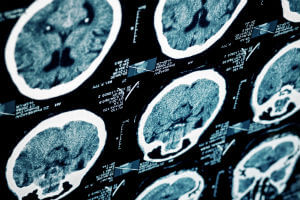Guide to Car Accident Head Injuries
Posted on behalf of Jeff Pitman on September 13, 2017
in Car Accidents
Updated on February 24, 2022
 Car accidents are one of the leading causes of traumatic brain injuries in the nation. In 2013 alone, 383,293 people sustained a traumatic brain injury in a car crash, according to the U.S. Centers for Disease Control and Prevention. These injuries are notoriously underreported so the actual number of head injuries from car accidents was probably even higher.
Car accidents are one of the leading causes of traumatic brain injuries in the nation. In 2013 alone, 383,293 people sustained a traumatic brain injury in a car crash, according to the U.S. Centers for Disease Control and Prevention. These injuries are notoriously underreported so the actual number of head injuries from car accidents was probably even higher.
Head injuries are some of the most severe injuries that occur in motor vehicle collisions, as many victims will develop long-term or permanent disabilities that require ongoing medical care.
If you suffered a head injury in a car accident, you may be entitled to compensation from the other driver or his or her insurance company. Schedule a free consultation with one of our experienced injury lawyers to determine your legal options.
Types of Head Injuries
There are two categories of head injuries: closed head injuries and open head injuries.
Closed Head Injuries
Closed head injuries occur when there is some type of internal damage to the brain. They are the result of the brain hitting the skull, which displaces cerebrospinal fluid and may lead to severe and even life-threatening injuries. Some of the most common closed head injuries include concussions and subdural hematomas.
Open Head Injuries
Any head or brain injury that is the result of penetration to the skull is considered an open head injury. These are commonly referred to as skull fractures. Examples of these injuries include:
- Linear skull fracture: This injury occurs when the skull has been penetrated, but not enough to expose brain tissue.
- Depressed skull fracture: This is an injury where the skull has been crushed by the blow.
- Basilar skull fracture: This is a fracture in the portion of the head closest to the spinal cord.
- Diastatic skull fracture: This is a fracture in the portion of the skull that fuses when an individual becomes an adult.
Regardless of which type of head injury you may have suffered after an accident, it is a good idea to get medical treatment immediately. If you wait, the injury could become worse and lengthen your recovery. Head injuries can be very serious and life-threatening so it is best not to wait.
Symptoms of Head Injuries
Knowing the signs of a head injury can help you discover when such an injury has occurred so you can get the medical attention you need.
These injuries can cause a wide variety of symptoms including:
- Irritability
- Headaches
- Dizziness
- Ringing in the ears
- Slurred speech
- Nausea
- Vomiting
- Seizures
- Loss of consciousness
- Cognitive disruptions, including problems with focusing, problem-solving and coordination
- Muscle spasticity
- Blurred vision or double vision
- Speech impairments
- Balance problems
- Memory loss
Consult One of Our Milwaukee Car Accident Attorneys
Everyone who travels on the road has a duty to others to follow the rules of the road to help prevent accidents and avoid causing harm to people in other cars. Drivers who do not uphold this duty could be held liable for damages suffered by other drivers, including medical expenses and pain and suffering.
If you or a loved one has suffered a head injury as a result of an auto accident, and you think the other driver is responsible, you may be able to pursue compensation.
Our attorneys have many years of experience pursuing compensation for victims of many types of car accidents. Contact us today to find out if we can help you.
Complete a Free Case Evaluation form today.






